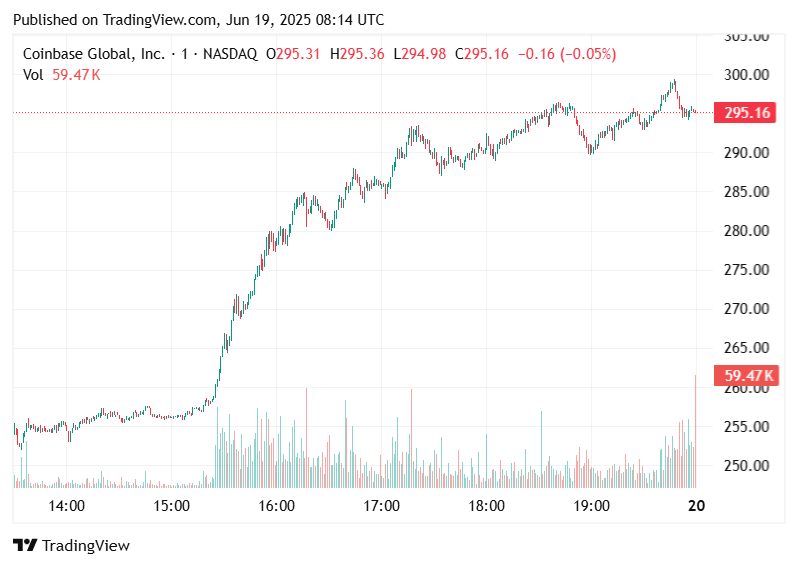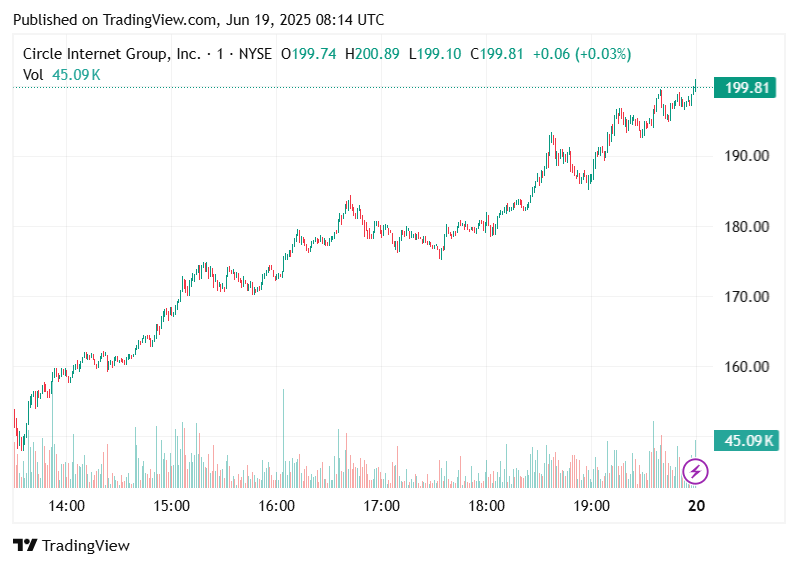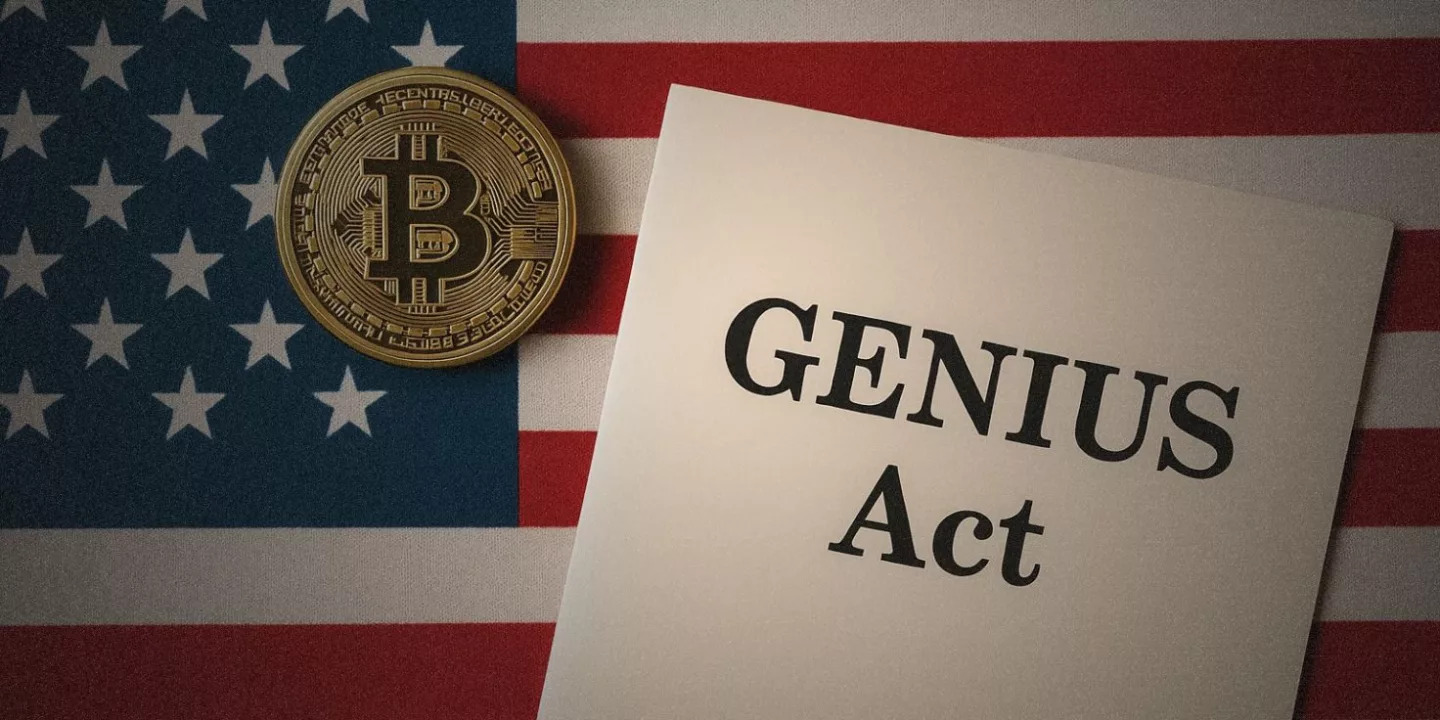The United States Senate decisively passed the Guiding and Establishing National Innovation for U.S. Stablecoins (GENIUS) Act on Tuesday, June 17, 2025, with a commanding 68-30 bipartisan vote.
This landmark legislation marks the first comprehensive federal framework for stablecoins, fundamentally reshaping the regulatory landscape for digital currencies.
Consequently, the GENIUS Act signals a new era of legitimacy and clarity for the crypto sector, sparking significant market reactions and igniting debates about the future of digital assets.
In this article, we actively explore the Act’s implications for digital currencies. We will look at its immediate impact on crypto stocks like Coinbase and Circle. We will also examine whether investors worldwide should remain bullish about cryptocurrencies in this transformative period.
Best Crypto Stocks to Look into in Q2 2025 After Circle’s Strong Performance
The GENIUS Act: A Bold Step Toward Regulatory Clarity
The GENIUS Act establishes a robust federal framework specifically for U.S. dollar-pegged stablecoins. This addresses long-standing uncertainties that have plagued the crypto industry.
By mandating 1:1 reserve backing, independent audits, and stringent anti-money laundering (AML) rules, the Act ensures that stablecoins such as Tether’s USDT, PayPal’s PYUSD, and Circle’s USD operate with transparency and stability.
Moreover, it centralises oversight under the U.S. Treasury, streamlining regulations and fostering trust among institutional and retail investors alike.
Unlike previous regulatory approaches, which often relied on enforcement actions, the GENIUS Act proactively creates a clear pathway for compliance. This encourages innovation while protecting consumers.
This regulatory clarity is a significant departure from the former Wild West era of cryptocurrency, as described by former SEC Chairman Gary Gensler.
Previously, the Securities and Exchange Commission (SEC) and the Commodity Futures Trading Commission (CFTC) clashed over whether cryptocurrencies should be classified as securities or commodities. This led to confusion and legal battles.
Now, with the GENIUS Act, stablecoins gain a distinct regulatory framework. In the not-too-distant future, this will reduce jurisdictional disputes and pave the way for broader adoption. Consequently, this shift empowers businesses. Both financial technology (fintech) startups and major financial institutions can confidently integrate stablecoins into their operations. These innovations could potentially transform digital payments and cross-border transactions.
Furthermore, the Act aligns with the pro-crypto stance of the second Trump administration, which has actively supported digital assets as a national priority.
President Trump’s executive order, issued in January 2025, declared cryptocurrencies vital to American economic leadership. This reinforces the GENIUS Act’s momentum.
By fostering a crypto-friendly environment, the U.S. government signals its intent to position the country as a global hub for blockchain innovation. In the long term, this could influence other nations to adopt similar frameworks.
Immediate Impact on Crypto Stocks: Coinbase and Circle Soar
The passage of the GENIUS Act triggered an immediate and electrifying response in the crypto market, particularly for stocks like Coinbase Global (NASDAQ: COIN) and Circle Internet Group (NASDAQ: CRCL).
On Wednesday, June 18, 2025, Coinbase’s stock (COIN) surged by an impressive 16%, closing at $295.29, after opening the day at $254. The stock’s intraday high was $299.32, which reflects strong investor confidence in the exchange’s ability to capitalise on the stablecoin boom. What’s more, COIN saw a month-high in daily trading volume with approximately $37 million poured into the asset during the day.

Similarly, Circle, the issuer of the USDC stablecoin, experienced a staggering 30% jump. CRCL shares reached $199.59 at the close of the market after opening at $153.22. This remarkable surge highlights the market’s enthusiasm for companies poised to benefit from the Act’s regulatory clarity.

Circle’s IPO: The Impact of Going Public on the Cryptocurrency Industry
COIN and CRCL primed to benefit
Coinbase, a leading cryptocurrency exchange and a major stakeholder in USDC, stands to gain significantly from the GENIUS Act.
The company’s revenue from stablecoin-related activities already soared 50% year-over-year (YoY) in the first quarter of 2025 to about $12.3 billion. The Act’s passage further solidifies its position.
By providing a clear regulatory framework, the Act enables Coinbase to expand its stablecoin offerings, attract institutional clients, and explore new ventures like tokenised equities.
Additionally, the SEC’s recent pause on enforcement actions against Coinbase signals a more collaborative regulatory approach, further boosting investor optimism.
Circle, meanwhile, has emerged as a powerhouse in the stablecoin sector, with USDC’s market capitalisation reaching $61.4 billion by mid-2025. The company’s stock, which has skyrocketed more than sixfold since its June 5, 2025, IPO at $31, reflects its dominance in the stablecoin market.
The GENIUS Act’s provisions, which allow banks and fintechs to issue stablecoins under strict oversight, position Circle to capture a significant share of the projected $2 trillion stablecoin market.
Circle’s CEO Jeremy Allaire believes the act can transform finance, solidifying Circle’s position as a crucial infrastructure provider.
However, the market’s response was not uniform across all cryptocurrencies. While stablecoin-focused companies like Coinbase and Circle saw significant gains, major cryptocurrencies like Bitcoin, Ethereum, and Solana remained relatively flat.
Diverging investor sentiment: institutions seek stablecoins’ safety, while retail investors remain wary of volatile assets’ risks and unpredictability.
Nevertheless, the overall market reaction accentuates the GENIUS Act’s role as a catalyst for mainstream adoption, particularly for stablecoins.
Global Implications for Digital Currencies
The GENIUS Act’s impact extends far beyond U.S. borders, influencing the global cryptocurrency landscape.
Stablecoins, mostly pegged to the U.S. dollar, enable instant digital payments with low fees, driving mainstream adoption and efficiency.
The Act’s regulatory framework enhances their credibility, making them an attractive alternative to traditional payment systems.
Consequently, banks, fintechs, and even retailers like Walmart and Amazon are exploring stablecoin integration. This could potentially revolutionise global commerce.
Moreover, the Act positions the U.S. as a leader in digital currency innovation, contrasting with Europe’s Markets in Crypto-Assets (MiCA) framework and Asia’s varied regulatory approaches.
By providing a clear and supportive environment, the U.S. could attract global capital and talent, fostering a vibrant crypto ecosystem.
However, the Act’s restrictions on non-financial tech giants issuing stablecoins without partnerships may limit competition. This ensures that regulated entities like Circle and Coinbase maintain a competitive edge.
Despite these advancements, the Act does not address all cryptocurrencies, focusing solely on stablecoins.
The GENIUS Act paves the way for future crypto laws, showcasing the U.S. commitment to innovation and regulatory clarity.
Should Investors Remain Bullish?
The question of whether crypto investors should remain bullish hinges on several factors.
First and foremost, the GENIUS Act’s passage is undeniably positive for stablecoin-focused companies and the broader crypto ecosystem. The projected growth of the stablecoin market to over $2 trillion, as forecasted by Treasury Secretary Scott Bessent, suggests immense opportunities for investors. Coinbase and Circle are poised to capitalise on crypto growth, with strong fundamentals making their stocks appealing investment opportunities now.
Trump’s pro-crypto stance and appointment of friendly regulators like Paul Atkins as SEC chair boost investor confidence significantly nationwide.”
The SEC’s Crypto Task Force, led by Hester Peirce, is actively working to clarify regulations for other digital assets, potentially unlocking new investment opportunities. Additionally, the approval of Bitcoin and Ethereum ETFs in 2024 and 2025, coupled with potential expansions for staking and in-kind redemptions, signals growing institutional adoption.
However, investors must remain cautious. The crypto market remains volatile, and security concerns persist, as evidenced by Coinbase’s $180–$400 million loss from a cyberattack in May 2025.
Moreover, the regulatory clarity benefits stablecoins, but other cryptocurrencies continue to face uncertainties until broader legislation takes effect. Global investors should also consider geopolitical risks and varying regulatory approaches, which could impact market dynamics.
Despite these challenges, the overall outlook for cryptocurrencies in 2025 is optimistic. The GENIUS Act, combined with a supportive regulatory environment, positions stablecoins as a cornerstone of the digital economy.
For investors, focusing on companies with strong ties to stablecoins, such as Coinbase and Circle, offers a compelling opportunity.
Additionally, the growing institutional interest, evidenced by BlackRock’s $70 billion Bitcoin holdings (per current prices, as of this publication) and the surge in ETF filings, suggests that cryptocurrencies are moving toward mainstream acceptance.
Pros and Cons of Investing in Agent Virtual Machine: Will AVM Be A Millionaire Token?
Conclusion: Does Crypto Have a Bright Future with the GENIUS Act?
In conclusion, the GENIUS Act marks a significant milestone for the cryptocurrency industry. It provides the much-needed regulatory clarity and fosters mainstream adoption of stablecoins.
Crypto stocks Coinbase and Circle skyrocketing, showcases market excitement, as the GENIUS Act’s global influence underscores its transformative crypto potential.”
Despite volatility and security challenges, supportive regulations and rising institutional interest create a strong case for bullishness in crypto investments.
As the U.S. drives crypto innovation, global investors must watch this evolving digital economy closely, prepared to seize emerging opportunities.


3 Comments
Pingback: Circle (CRCL) Skyrockets as Trading Volume Hits $62 Million after GENIUS Act Passage » CyptoGuide Ghana
Hola, volia saber el seu preu.
Pingback: The Genius Act's Passage Sent Coinbase Up 17% » CyptoGuide Ghana